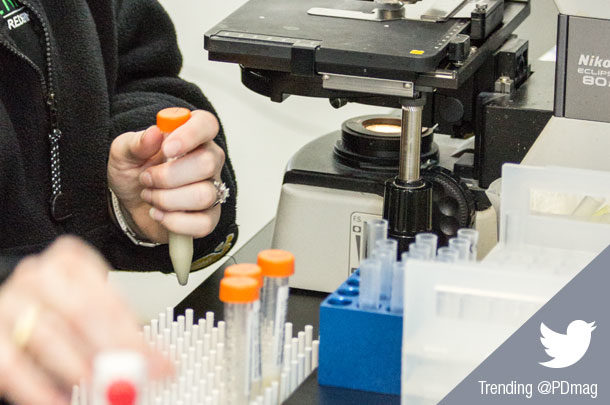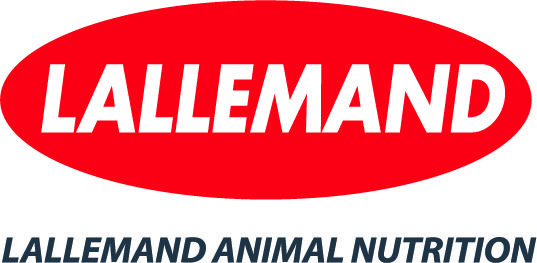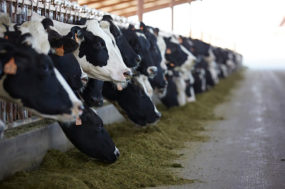Producers report these data to their milk recording agency or their DSA veterinarian in Quebec.
This accumulation of data has led to the implementation of a routine genetic evaluation for clinical mastitis. Since August 2014, breeding values for mastitis resistance are published for the Holstein, Ayrshire and Jersey breeds.
The next step will be to develop genetic evaluations for metabolic diseases and fertility disorders.
In Canadian Holsteins, overall disease frequencies are 3.3, 5.1, 1.2, 5, 10.1 and 10.1 percent for displaced abomasum, clinical ketosis, milk fever, retained placenta, metritis and cystic ovaries, respectively. Disease frequencies are lowest in first-lactation cows and are increasing with parity (Figure 1).
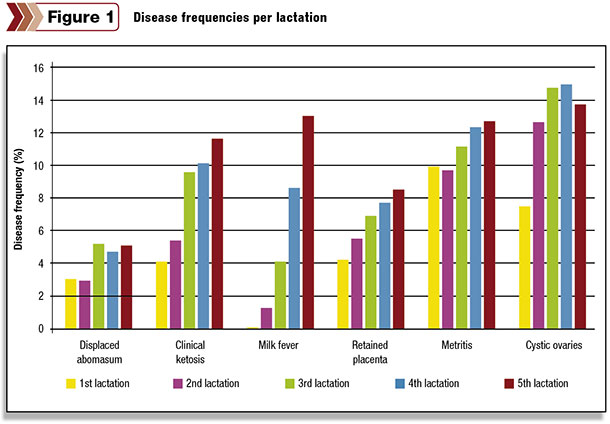 A new study examined heritabilities of metabolic diseases and fertility disorders. It was found that these traits have a low heritability, with estimates ranging from 1 to 5 percent. Despite the low heritability, large differences between daughter groups were observed based on the best and worst breeding values.
A new study examined heritabilities of metabolic diseases and fertility disorders. It was found that these traits have a low heritability, with estimates ranging from 1 to 5 percent. Despite the low heritability, large differences between daughter groups were observed based on the best and worst breeding values.
For example, one out of 11 daughters had a displaced abomasum case in her first lactation for the worst bulls, while only one out of 250 daughters of the best sires was affected by displaced abomasum (Table 1).
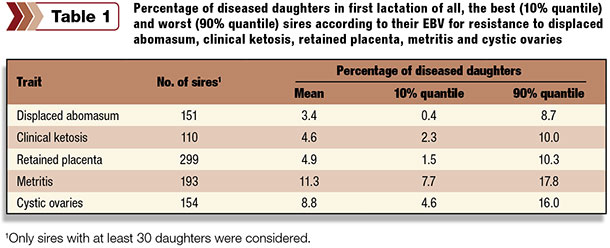 Subsequently, metabolic diseases and their main predictors were analyzed. It was found that animals more resistant to metabolic diseases have a higher body condition score, a lower fat-to-protein ratio and a lower milk beta-hydroxybutyrate (BHBA). Milk BHBA is highly correlated with clinical ketosis and is therefore a very promising predictor.
Subsequently, metabolic diseases and their main predictors were analyzed. It was found that animals more resistant to metabolic diseases have a higher body condition score, a lower fat-to-protein ratio and a lower milk beta-hydroxybutyrate (BHBA). Milk BHBA is highly correlated with clinical ketosis and is therefore a very promising predictor.
Milk BHBA is used as a screening method for subclinical ketosis. The most common way to detect subclinical ketosis is through the use of a laboratory test. Blood samples from cattle are tested for their levels of BHBA; however, due to practical limitations, this sampling procedure is not suitable for routine analysis.
Alternatively, concentrations of ketone bodies in milk are highly correlated with blood levels as shown by researchers from the University of Montreal and Valacta. Milk BHBA can be analyzed routinely in milk samples by mid-infrared spectrometry, the technology that is also used to analyze protein, fat and lactose content in milk.
Since October 2011, screening for subclinical ketosis based on a milk BHBA analysis of test-day milk samples is offered by Valacta. It is intended to accumulate more milk BHBA records also for CanWest DHI herds.
In a further study, fertility disorders and their predictor traits were investigated. The main findings were that dairy cows more resistant to fertility disorders have a higher body condition score, a lower interval from calving to first service and a higher non-return rate (genetically).
But the correlations were low to moderate; therefore, it is important to select directly for resistance to fertility disorders to reduce the incidence.
Genetic correlations between diseases were mostly positive. Cows more resistant to one disease are also more resistant to other diseases.
This may be due to a general immune response. Professor Bonnie Mallard and her team from the department of pathobiology at the University of Guelph found cows with high immune response have decreased disease risks.
Positive associations between disease resistance traits and longevity were found. This means selection for disease resistance would inevitably lead to selecting dairy cattle with longer herd life.
Breeding values for resistance to diseases will provide dairy producers with an advanced tool for genetic selection of a healthy and more balanced dairy cow.
All dairy producers recording health data are gratefully acknowledged. Recording of health data is the precondition for genetic evaluations of disease resistance. PD
This project is funded by the DairyGen council of Canadian Dairy Network, the Natural Sciences and Engineering Research Council of Canada and the Dairy Research Cluster Initiative (Dairy Farmers of Canada, Agriculture and Agri-Food Canada, the Canadian Dairy Network and the Canadian Dairy Commission).
Filippo Miglior is with Canadian Dairy Network and University of Guelph. Astrid Koeck is with University of Guelph.
